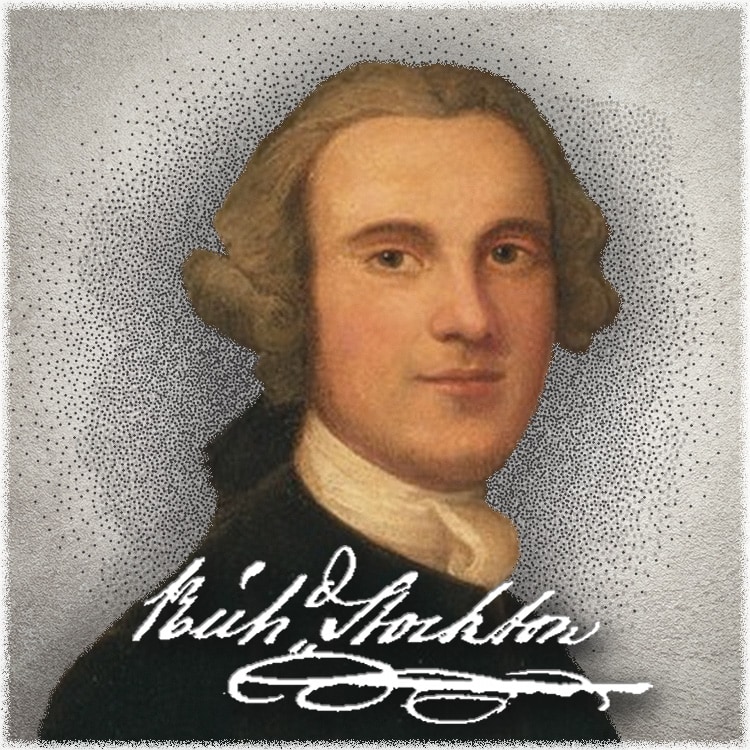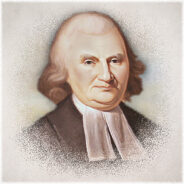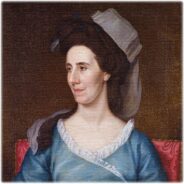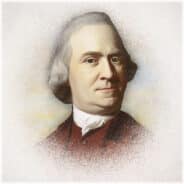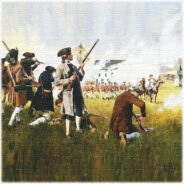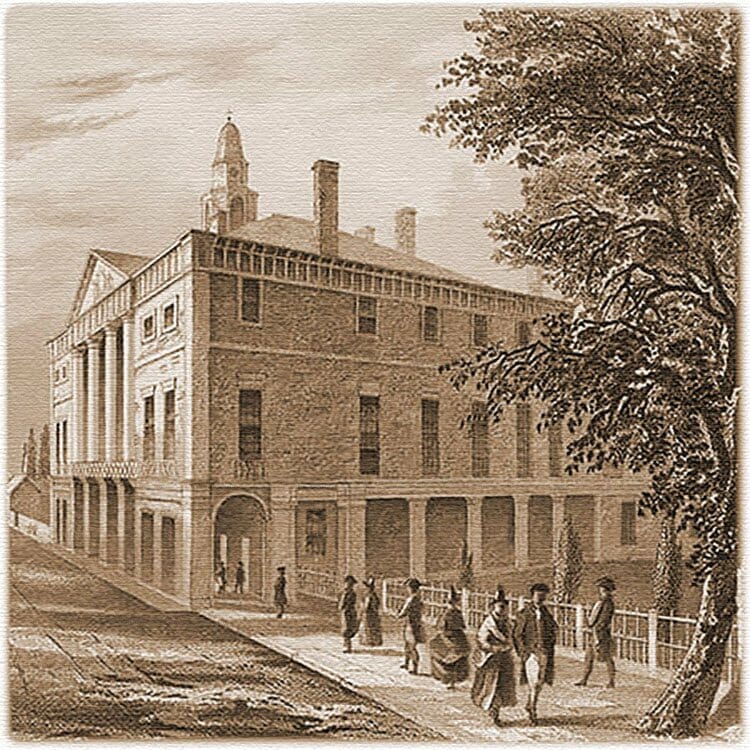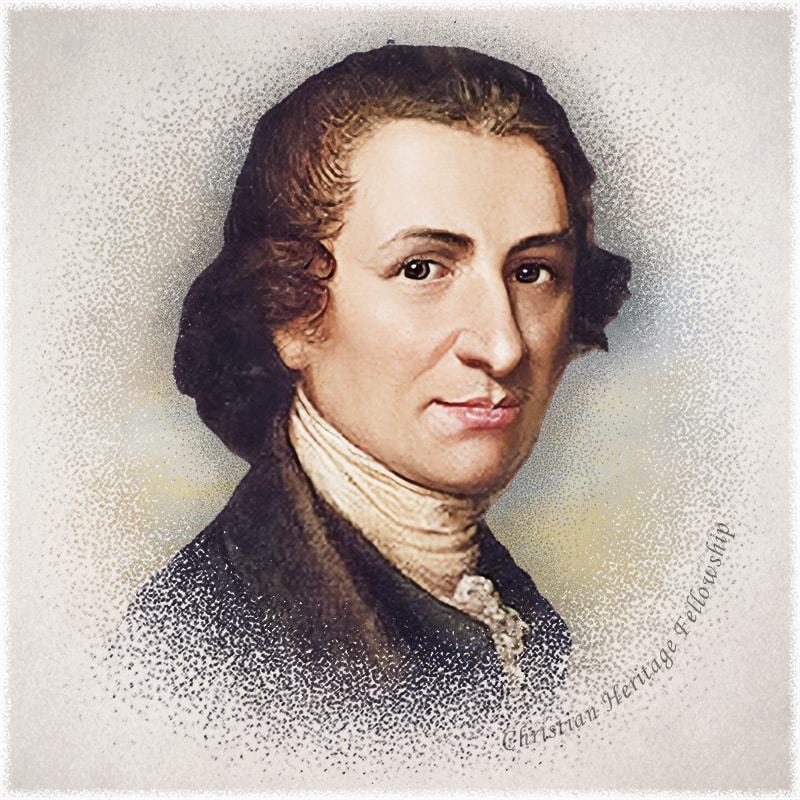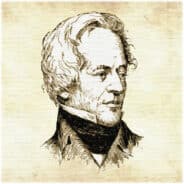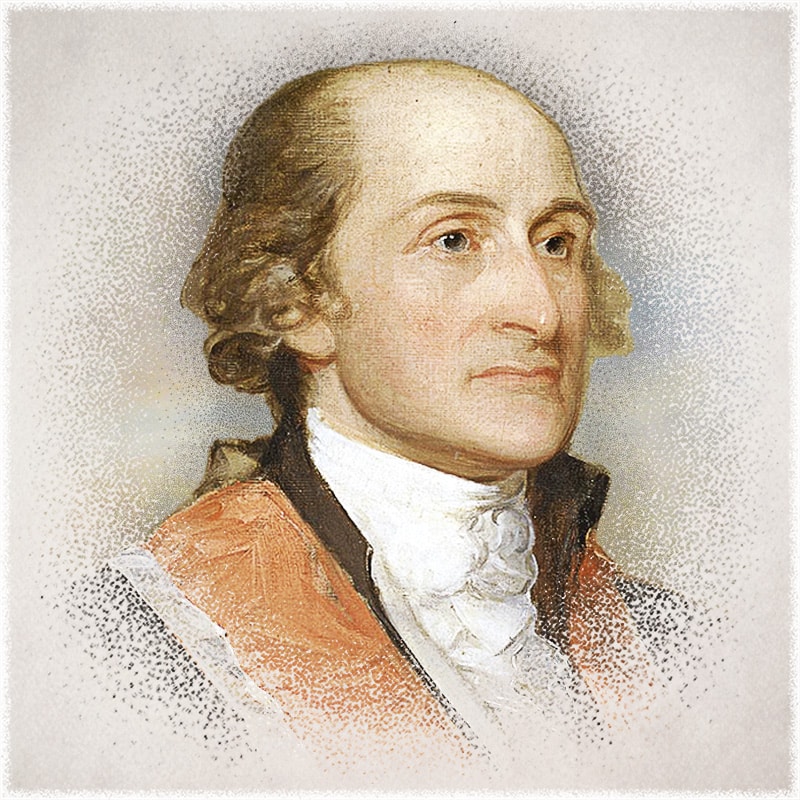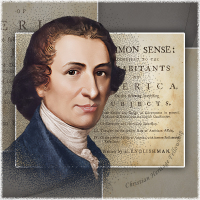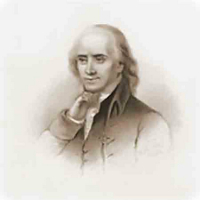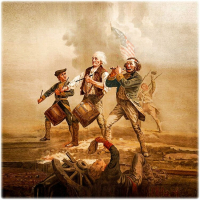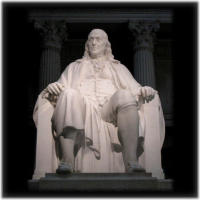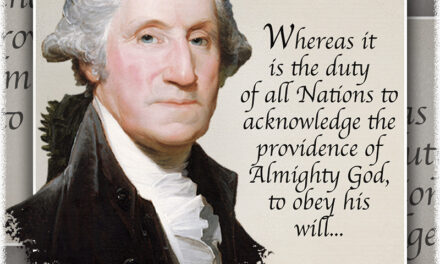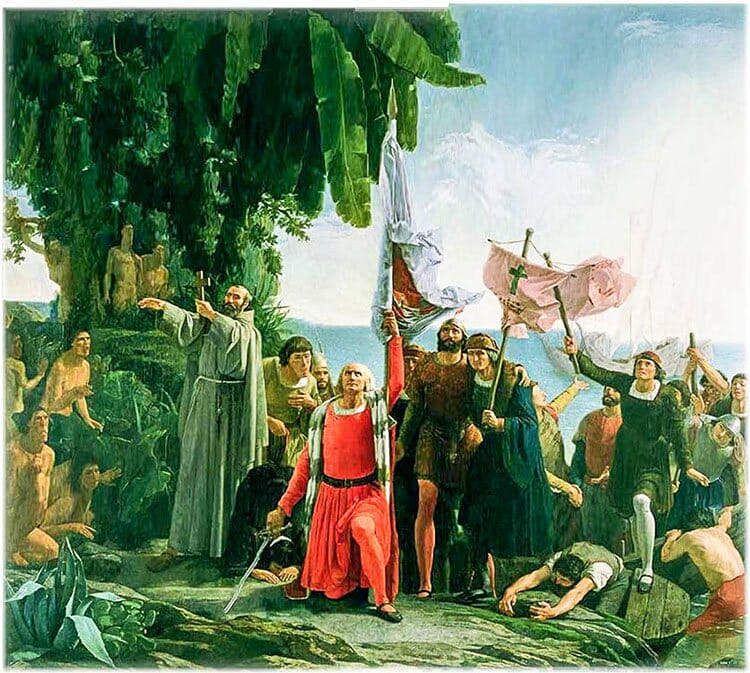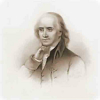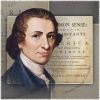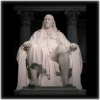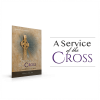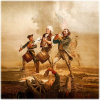Elias Boudinot: Building America on Christ
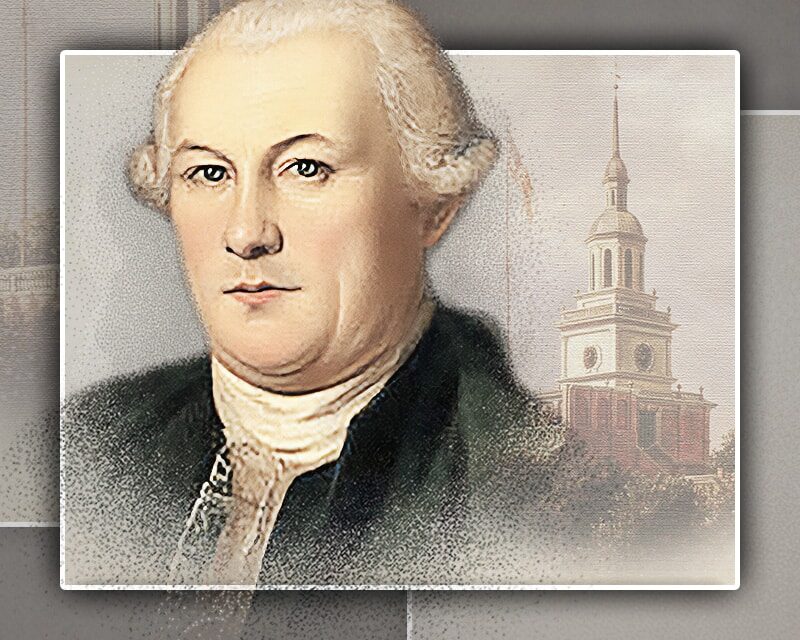
- 145
- 146shares
While it is not true that Elias Boudinot, of New Jersey, started the Thanksgiving tradition in America, it is true that he did initiate the practice of presidential proclamations that traditionally accompany the American Thanksgiving season and which provides "an opportunity to all the citizens of the United States of joining, with one voice, in returning to Almighty God their sincere thanks for the many blessings he … [has] poured down upon them." In addition, Elias Boudinot was one of the presidents of the Continental Congress, serving in that office from November 4, 1782 to November 3, 1783. He had served his country well in the years of war in which America made a bid for its independence, and as the war came to an end, it was Elias Boudinot who—as president of Congress—was called upon to sign the Paris Peace Treaty that brought the American War of Independence to a formal conclusion.
It is not true that America's Founding Fathers were deists or secular[1] in their religious sentiments. Since the 1940s, liberal and "aAmerican"[2] or un-American judges have sought to establish the legal foundation of America upon a footing that is vastly different than the Christian moral foundation of America's Founding Fathers. This new legal foundation of aAmericans is new and alien to the original intent of America's Christian origin, which originated with the earliest English settlements of Jamestown and Plymouth and continued through the establishment of America as an independent nation by the Founding Fathers.
While it may be said that not all of the Founding Fathers who established America as an independent nation were Christian in the fullest biblical sense of the term, it may not be said that any of them were not Christian in their morals, sentiments, or sympathies—with exception to the latter religious and intellectual changes that characterized Thomas Paine.[3] In fact, Elias Boudinot represents the Christian sentiments of the overwhelming majority of America's Founding Fathers and aggressively sought to refute the irreligious and secular sentiments that Thomas Paine came to acquire during his stay in France. The Christian life of Elias Boudinot is representative of the vast majority of America's Founding Fathers that composes a vast mosaic of American heritage that Christians must not allow secularists and the irreligious to take from them!
The subject addressed in this article is discussed at greater length in America's Founding Fathers and the Bible. Christian Heritage Fellowship would be honored to work with individuals, businesses, churches, institutions, or organizations to help communicate the truth concerning the positive influence of the Christian faith by providing bulk pricing: Please contact us here... To purchase a limited quantity of this publication, please click: Purchase here...
Article Contents
Elias Boudinot was born in Philadelphia, Pennsylvania on May 2, 1740 to Elias Boudinot III, a merchant and silversmith and neighbor and friend of Benjamin Franklin. His mother, Mary Catherine Williams, was born in the British West Indies of Welsh ancestry. Elias's paternal great-grandparents, Jean Boudinot and Marie Suire of Marans, Aunis, France, were Huguenots (French Calvinistic Protestants) who fled to New York about 1687 to avoid the persecution many Protestants experienced at the hands of King Louis XIV.[4]
The Boudinot family became firmly interwoven with other leading families of the American Revolution. Nine children were born to Elias's parents, Mary Catherine and Elias Boudinot Sr., but of these, only the younger Elias and his three siblings, Annis, Mary, and Elisha, survived to adulthood. Annis distinguished herself as one of the first published women poets in the Thirteen Colonies, while brother Elisha Boudinot became the Chief Justice of the Supreme Court of New Jersey. In addition to these distinctions, sister Annis married Richard Stockton, one of the fifty-six signers of the Declaration of Independence.
Like many in early America, Elias was home-schooled before being sent to Princeton where he studied law. Princeton (which was known as the College of New Jersey at that time) became one of the most influential centers for the sake of American Independence under the presidency of Rev. Dr. John Witherspoon,[5] who was also a signer of the Declaration of Independence and instrumental figure in the effort to convene the Constitutional Convention in 1787. Though Elias Boudinot graduated from Princeton before the presidency of Dr. Witherspoon, there can be no doubt that the two men knew each other well given the fact that Elias became a member of the board of trustees of Princeton in 1772 and retained his membership on the board until his death in 1821. While at Princeton, Elias began to read the law as a legal apprentice to Richard Stockton who had graduated from Princeton in 1748 and who would become Elias's brother-in-law.
He was admitted to the bar in 1760 and began to practice law in Elizabeth, New Jersey. Boudinot's law practice prospered and he soon became a prominent lawyer. After establishing himself in his practice, Elias married Hannah Stockton, the sister of Richard Stockton on April 21, 1762. Several years earlier (about 1757), Richard Stockton had married Annis, Elias's sister. Together, Elias and Hannah had two children, Maria (who died at age two) and Susan.
The political influence of Elias Boudinot was also extended through his son-in-law, Susan's husband, William Bradford. Having begun his military service as a private in the Pennsylvania militia, Bradford rose from the rank of captain to lieutenant colonel in the Continental Army, but poor health forced him to resign his post in 1779—before the conclusion of the Revolutionary War. Bradford, having also studied law at Princeton, went on to distinguish himself as a lawyer, arguing in the first recorded case before the United States Supreme Court (1791), serving on the Supreme Court of Pennsylvania (1791 - 1794), and serving as the Attorney General for the United States (1794 - 1795), before passing away in office in 1795.[6]
Unable to rely on those loyal to King George, American colonists resorted to developing their own system of communication and shadowing royal government officials. These efforts were organized into local committees of various names. Sometimes they were called committees of safety, committees of observation, committees of inspection, or committees of correspondence.[7] Over time, these committees took control of the Thirteen Colonies away from royal officials who became increasingly helpless as America moved toward independence. The first informal efforts of some of these committees began in 1764,[8] but the first formal efforts to develop a network of communication began in 1772 under the Christian leadership of Samuel Adams, "Father of the American Revolution." Adams initially formed a committee to protest the decision to have the King pay for the salaries of royal governors and judges rather than the colonial assemblies. Samuel Adams and others regarded this as a loss of influence and self-direction of the colonies. The purpose of the Committee was to communicate to the public "the rights of the colonists, and of this province in particular [Massachusetts], as men, as Christians, and as subjects; to communicate and publish the same to the several towns in this province and to the world as the sense of this town".[9]
On June 11, 1774, Elias Boudinot became a member of the committee of correspondence in Essex County, New Jersey[10] and quickly rose to the leadership of the committee. On the evening of April 23, 1775, he received a communication from the committee of correspondence in Watertown, near Boston, apprising him of the Battle of Lexington and the ensuing events. It read as follows:
— J. Palmer one of the Committee of s—y—[11]
That communiqué was soon followed by another later that same day:
Sir, I am this moment informed by express [or courier] from Woodstock taken from the mouth of the express that arrived there 2 o'clock afternoon that the contest between the first brigade that marched to Concord, was still continuing this morning at the town of Lexington, to which 2d brigade had retreated. That another brigade said to be the second mentioned in the letter of this morning had landed with a quantity of artillery at the place where the first did. The Provincials [Americans] were determined to prevent the two brigades from joining their strength if possible, and remain in great need of succour [or support].
— NB The [British] regulars when in Concord, burnt the Court house—took 2 pieces of cannon which they rendered useless and began to take up Concord bridge, on which Capt. (who with many on both sides were soon killed) made an attack on the King's Troops, when they retreated to Lexington. I am andc.
Eb Williams
P.S. Mr. and Mrs. Farland of Plainfield [Massachusetts], has just returned from Boston by way of Providence, who conversed with an express from Lexington, who further informs, that about 4000 of our troops had surrounded the first brigade who were on a hill in Lexington. That the action continued and there were about 50 of the [American] men killed and 150 [British] regulars as near as they could determine when the express came away. It will be expedient for every man to go, who is fit and willing.[12]
Into the War of Independence, Boudinot threw his life's energy. In 1775, he was elected to the New Jersey provincial assembly, and like all patriots, his thoughts were continually upon the support of the American cause. As the War of Independence was engaged, he loaned field commanders money to purchase desperately needed supplies for American forces and actively supported the efforts of American spies. His participation in the committee of correspondence no doubt was the natural bridge into American spying efforts.
On May 5, 1777, General George Washington asked Boudinot to accept the office of Commissary General for Prisoners, which managed enemy prisoners and supplied American prisoners held captive by the British. Congress concurred with his appointment, and Boudinot was granted a commission as colonel in the Continental Army, giving him military authority to conduct his duties.
He held his office as Commissary General for only a relatively short period of time. In November 1777, the legislature of New Jersey appointed him as a state delegate to the Second Continental Congress, but his duties as Commissary prevented him from attending. In May 1778, he resigned his office as Commissary and by July 7, 1778, he was able to attend his first session of Congress, from which place he continued to seek the welfare of prisoners of war.
With his first term in Congress ending at the close of 1778, he did not return to Congress until 1781, at which time he served in this office until 1783 when the term expired. One of the great distinctions of his life was experienced in Congress when he served from 1782 to 1783 as President of Congress. But, additional distinction was received when, as President of Congress, he was called upon to sign the treaty of peace with England, known as the Paris Peace Treaty (in 1783).
With American independence won, Elias returned to his law practice, but, like George Washington, he was called once again to serve his country. Once the United States Constitution was ratified in 1789, he was elected from New Jersey to the United States House of Representatives to serve in the First, Second, and Third Congresses (from March 4, 1789 to March 3, 1795), but refused to be renominated for the Fourth Congress. The same year he stepped down from Congress, President Washington nominated him as the second Director of the Mint, in which capacity he served from 1795 to 1805.
One of Boudinot's legacies to America occurred during his first term in the House of Representatives. On Friday September 25, 1789, Mr. Boudinot made a motion on the floor of the House of Representatives that would eventually help establish America's annual Thanksgiving. The details of his motion are part of the records of Congress:
Mr. Boudinot said, he could not think of letting the session [of Congress] pass over without offering an opportunity to all the citizens of the United States of joining, with one voice, in returning to Almighty God their sincere thanks for the many blessings he had poured down upon them. With this view, therefore, he would move the following resolution:
Resolved, That a joint committee of both Houses be directed to wait upon the President of the United States, to request that he would recommend to the people of the United States a day of public thanksgiving and prayer, to be observed by acknowledging, with grateful hearts, the many signal favors of Almighty God, especially by affording them an opportunity peaceably to establish a Constitution of government for their safety and happiness.
Mr. Burke did not like this mimicking of European customs, where they made a mere mockery of thanksgivings. Two parties at war frequently sung Te Deum for the same event, though to one it was a victory, and to the other a defeat.
Mr. Boudinot was sorry to hear arguments drawn from the abuse of a good thing against the use of it. He hoped no gentleman would make a serious opposition to a measure both prudent and just.
Mr. Tucker thought the House had no business to interfere in a matter which did not concern them. Why should the President direct the people to do what, perhaps, they have no mind to do‒ They may not be inclined to return thanks for a Constitution until they have experienced that it promotes their safety and happiness. We do not yet know but they may have reason to be dissatisfied with the effects it has already produced; but whether this be so or not, it is a business with which Congress have nothing to do; it is a religious matter, and, as such, is proscribed to us. If a day of thanksgiving must take place, let it be done by the authority of the several States; they know best what reason their constituents have to be pleased with the establishment of this Constitution.
Mr. Sherman justified the practice of thanksgiving, on any signal event, not only as a laudable one in itself, but as warranted by a number of precedents in holy writ: for instance, the solemn thanksgivings and rejoicings which took place in the time of Solomon, after the building of the temple, was a case in point. This example, he thought, worthy of Christian imitation on the present occasion; and he would agree with the gentleman who moved the resolution.
Mr. Boudinot quoted further precedents from the practice of the late Congress [and how this had been done on four occasions] ; and hoped the motion would meet a ready acquiescence.
The question was now put on the resolution, and it was carried in the affirmative; and Messrs. Boudinot, Sherman, and Sylvester were appointed a committee on the part of the House.[13]
The close of this era signaled the final chapter of his life, but he had yet much to bequeath to his country.
In 1805, Elias and his wife Hannah and their widowed daughter, Susan, moved to a new home in Burlington, New Jersey. Here, Hannah passed away only a few years later, leaving Elias to remain in this home until the end of his life.
Through his service to the Board of Trustees at Princeton, Boudinot was instrumental in promoting one of the most distinguished evangelical institutions in American history—though this evangelical legacy was greatly altered by Princeton's capitulation to liberalism at the beginning of the twentieth century. As a Presbyterian, Boudinot's deeply held biblical convictions expressed themselves throughout his life, but two expressions of his mature Christian faith are particularly noteworthy.
The first expression concerned his refutation of the champion of present-day American secularists, Thomas Paine. Whereas Paine's first significant political work, Common Sense,[14] employed arguments based upon the Bible, his subsequent works The Rights of Man and Age of Reason were decidedly secular and irreligious. Paine published his Age of Reason in three parts, the first two parts were published in 1794 and 1795 and the third part, he published in 1807. Founding Fathers who had welcomed and supported Paine when he immigrated to America from England soon turned against him for having attacked Christianity in the Age of Reason. In fact, after receiving a manuscript of Age of Reason from Paine before its publication, Benjamin Franklin pleaded with Paine not to publish it.[15] With other Founding Fathers, Boudinot was incensed by Paine's Age of Reason and openly challenged Paine by publishing his own response in 1801 titled, The Age of Revelation, or The Age Of Reason Shown to Be an Age of Infidelity. In his book, Boudinot not only demonstrated his contempt for Paine's irreligion but also discloses the contempt that America's Founding Fathers had for secular infidelity and deism.[16]
The second notable expression of Boudinot's Christian faith in his most mature years occurred in relation to the formation of the American Bible Society. In poor health, Elias Boudinot was burdened for a "general Bible society" that could distribute the Bible throughout America and around the world. Though state and local Bible societies existed, his vision was broader and universal in scope. In a letter to William Jay, the son of John Jay, America's first Chief Justice of the Supreme Court, Boudinot helped to lay the plans for what was to become the American Bible Society.[17]
More than a month after Elias composed this letter to William Jay, a meeting was convened in New York City to organize "a general Bible Society" in America, and on May 11, 1816, the newly formed American Bible Society elected Elias Boudinot as its first president. Elias served in this capacity until his death five years later.
Beginning with Elias Boudinot, some very distinguished Americans have occupied the presidency of the American Bible Society. From the beginning of the American Bible Society, the first Chief Justice of the Supreme Court, John Jay, was a member. At the beginning of the Society, Chief Justice Jay was elected vice-president, and at the death of Elias Boudinot in 1821, Jay was elected president. Other distinguished presidents include Frederick Theodore Frelinghuysen—distinguished lawyer, United States Senator, and Secretary of State, Daniel Coit Gilman—president of Johns Hopkins University, Edwin Francis Hyde, a former president of the Philharmonic Society of New York, and one of the most distinguished vice-presidents was Francis Scott Key—author of the United States' National Anthem.
For decades, the truth concerning America's Christian heritage has been denied and denounced by secularists and the irreligious. The overwhelming majority of Founding Fathers were deeply dedicated Christians who were not ashamed to emblazon upon the institutions of America legacies of the Gospel of Jesus Christ. Like many other Founding Fathers, Elias Boudinot was not ashamed to advocate the principles of Christianity in the corridors of the nation's most hallowed halls. Today, America desperately needs men and women who will follow the example of Elias Boudinot in the same and similar halls of authority!
Though the record of an individual's life is generally composed from the materials in between the bookends of life, the closing moments of life are often appropriate summaries of what one has treasured most deeply. On October 24, 1821, Elias Boudinot passed into eternity at this home in Burlington, New Jersey. Indeed, the last words spoken by Elias Boudinot are apt expressions of a life well-lived for Christ, as was noted by one of his biographers:
By the religion which he professed, he was supported and cheered as he went down to the grave. His patience was unexhausted his faith was strong and triumphant. Exhorting those around him to rest in Jesus Christ as the only ground of trust and commending his daughter and only child to the care of his friends, he expressed his desire to depart in peace to the bosom of his Father in heaven, and his last prayer was, "Lord Jesus receive my spirit."[18]
America deserves to know its true heritage.
Please contribute today!
"Anchor Elements" are concepts, events, individuals, terms, or other important components that are featured in this article and which act as reference points for use in other articles throughout our site.
[1] Here "secular" is applied to all forms of irreligion, including atheism and agnosticism.
[2] Here "aAmerican" means un-American or not American. The "a" of "aAmerican," is derived from the Greek which means "not" or "no."
[3] Thomas Paine traveled to France after he published his well-received pamphlet, Common Sense (1776). This pamphlet did not reflect his anti-Christian sentiments that developed during his stay in France where he was influenced by the infidelity of Voltaire, Rousseau, and other "intellectuals." After returning to America, he published his irreligious sentiments in Age of Reason, which Benjamin Franklin discouraged him from publishing.
[4] "Elias Boudinot," Wikipedia (https://en.wikipedia.org/wiki/Elias_Boudinot, October 12, 2015).
[5] Dr. Witherspoon's presidential tenure of Princeton was from 1768 to 1794. See "John Witherspoon," Wikipedia (https://en.wikipedia.org/wiki/John_Witherspoon, October 13, 2015).
[6] Susan Boudinot and William Bradford were married in 1784. "William Bradford (Attorney General)," Wikipedia (https://en.wikipedia.org/wiki/William_Bradford_%28Attorney_General%29, October 13, 2015).
[7] "Committees of safety (American Revolution)," Wikipedia (https://en.wikipedia.org/wiki/Committees_of_safety_%28American_Revolution%29, October 14, 2015).
[8] In 1764, a committee was charged with rallying opposition to the Currency Act. The following year, New York called upon its neighbors to respond to the Stamp Act, and Massachusetts responded by urging other colonies to send delegates to the Stamp Act Congress that fall.
[9] Smith, Page. A New Age Now Begins: A People’s History of the American Revolution. New York: McGraw-Hill, 1976., 368
[10] John W. Barber and Henry Howe, New Jersey Historical Collection (n.p., n.d.), 170, 171; quoted in Boudinot, Elias. The Life, Public Services, Addresses, and Letters of Elias Boudinot, L.l.d., President of the Continental Congress. ed. Jane J. Boudinot. New York: Houghton, Mifflin and Company, 1896., 1:3-4
[11] Boudinot, Elias. The Life, Public Services, Addresses, and Letters of Elias Boudinot, L.l.d., President of the Continental Congress. ed. Jane J. Boudinot. New York: Houghton, Mifflin and Company, 1896., 7
[12] Boudinot, Elias. The Life, Public Services, Addresses, and Letters of Elias Boudinot, L.l.d., President of the Continental Congress. ed. Jane J. Boudinot. New York: Houghton, Mifflin and Company, 1896., 8-9
[13] The Debates and Proceedings in the Congress of the United States With an Appendix Containing Important State Papers and Public Documents and All the Laws of a Public Nature : With a Copious Index. Washington [D.C.] : Prin, 1:949-950
[14] Common Sense was first published in January 1776.
[15] After reading Paine's manuscript of Age of Reason, Mr. Franklin responded, urging him not to publish it. As he closed his letter to Paine, Franklin wrote,
…think how great a portion of mankind consists of weak and ignorant men and women, and of inexperienced, inconsiderate youth of both sexes, who have need of the motives of religion to restrain them from vice, to support their virtue, and retain them in the practice of it till it becomes habitual, which is the great point for its security. And perhaps you are indebted to her originally, that is, to your religious education, for the habits of virtue upon which you now justly value yourself. You might easily display your excellent talents of reasoning upon a less hazardous subject, and thereby obtain a rank with our most distinguished authors. For among us it is not necessary, as among the Hottentots, that a youth, to be raised into the company of men, should prove his manhood by beating his mother.
I would advise you, therefore, not to attempt unchaining the tiger [or publish this work], but to burn this piece before it is seen by any other person; whereby you will save yourself a great deal of mortification by the enemies it may raise against you, and perhaps a good deal of regret and repentance. If men are so wicked with religion, what would they be if without it. I intend this letter itself as a proof of my friendship, and therefore add no professions to it; but subscribe simply yours,
B. Franklin
Jared Sparks, The Works of Benjamin Franklin (Boston: Tappan, Whittemore, and Mason, 1840), 10:281-282; quoted in "Benjamin Franklin's letter to Thomas Paine," WallBuilders (http://www.wallbuilders.com/libissuesarticles.asp‒id=58, April 15, 2015).
[16] In his introduction, Boudinot wrote:
When I first took up this treatise, I considered it as one of those vicious and absurd publications, filled with ignorant declamation and ridiculous representations of simple facts, the reading of which, with attention, would be an undue waste of time; but afterwards, finding it often the subject of conversation, in all ranks of society, and knowing the author to be generally plausible in his language, and very artful in turning the clearest truths into ridicule, I determined to read it, with an honest design of impartially examining into its real merits.
I confess, that I was much mortified to find, the whole force of this vain man's genius and art, pointed at the youth of America, and her unlearned citizens, (for I have no doubt, but that it was originally intended for them) in hopes of raising a skeptical temper and disposition in their minds, well knowing that this was the best inlet to infidelity, and the most effectual way of serving its cause, thereby sapping the foundation of our holy religion in their minds.
. . .
. . . be assured . . . [reader] that this author's whole work, is made up of old objections, [that have already been] answered, and that conclusively, [answered] a thousand times over, by the advocates for our holy religion. Some of them he has endeavored to clothe with new language, and put into a more ridiculous form; but many of them he has collected almost word for word, from the writings of the deists of the last and present century. Elias Boudinot, The Age of Revelation, or, the Age of Reason Shewn to be an Age of Infidelity (Philadelphia: Asbury Dickins, 1801), xii, xiv, xv.
[17] In a letter to William Jay dated April 4, 1816, Boudinot wrote:
My dear Sir:
By the blessing of Almighty God, after near Six Months close confinement, I am permitted to set up in my Bed, for 3 Hours in the Day. These precious moments, I have devoted to a full consideration of one of the greatest and most interesting subjects (a general Bible Society) that has ever honored the Children of Men. Weak and feeble, scarcely able to think or write, my Efforts promised but little in the great Cause, when your welcome and unexpected Letter of the 2nd Ultimo was brought in. My-drooping Spirits were raised-my Heart was indeed cheered and my mind greatly revived. I could not help giving glory to God for the great Encouragement afforded me to press on in this glorious Cause, when I thus beheld his special Mercy in raising up so powerful a support in this joyous work and Labor of Love. Tho' it is not more than 2 Hours since I received it, I am attempting to scribble a few lines of acknowledgment and gratitude for your excellent memoir. I fear you will not be able to read it, being among my first essays in letter writing and rather against medical advice. I have already sent for a Printer to engage him to publish the memoir without delay, but I wish to have your candid opinion on my Idea of changing a few sentences of the constitution. I have prepared a very rough draught of one which greatly coincides with yours in the leading points, …
…
I wish to promote a principle of perfect equality of right, universal Brotherly love, founded on Gospel purity, and where we cannot agree to unite, we may agree to differ in peace and good will. I consider the present call to enter into our Lord's vineyard, as laborers, tho' at the eleventh hour, to be one of the most encouraging opportunities and imperious calls that ever has been conferred on the Christian professor to promote the glory of God and the best interest of his fellow men.
…
Pardon, dear Sir, the garrulity of an old man who even forgets his extreme weakness and the prohibitions of his physician. Forgive his blunders and incorrectness, for he is almost exhausted. I can Only again express my obligations to you and subscribe myself with great sincerity.
Yours most Affectionately,
Elias Boudinot
"Letter from Elias Boudinot to William Jay on the Founding of a General Bible Society, Dated April 4, 1816," American Bible History (http://www.americanbiblehistory.com/boudinot-jay-letter.html, October 16, 2015).
[18] Allen, William. The American Biographical Dictionary : Containing an Account of the Lives, Characters, and Writings of the Most Eminent Persons Deceased in North America From Its First Settlement. 3d ed. ed. Boston Clev, 106
Elias Boudinot: Building America on Christ
Elias Boudinot: Building America on Christ
Elias Boudinot: Building America on Christ
Elias Boudinot: Building America on Christ
Elias Boudinot: Building America on Christ
Elias Boudinot: Building America on Christ
Elias Boudinot: Building America on Christ
Elias Boudinot: Building America on Christ
Elias Boudinot: Building America on Christ
Elias Boudinot: Building America on Christ
Elias Boudinot: Building America on Christ
Elias Boudinot: Building America on Christ
Elias Boudinot: Building America on Christ
Elias Boudinot: Building America on Christ
Elias Boudinot: Building America on Christ
Elias Boudinot: Building America on Christ
Elias Boudinot: Building America on Christ
Elias Boudinot: Building America on Christ
Elias Boudinot: Building America on Christ
Elias Boudinot: Building America on Christ
Elias Boudinot: Building America on Christ
Elias Boudinot: Building America on Christ
Elias Boudinot: Building America on Christ
Elias Boudinot: Building America on Christ
Elias Boudinot: Building America on Christ
Elias Boudinot: Building America on Christ
Elias Boudinot: Building America on Christ
Elias Boudinot: Building America on Christ
Elias Boudinot: Building America on Christ
Elias Boudinot: Building America on Christ
Elias Boudinot: Building America on Christ
Elias Boudinot: Building America on Christ
Elias Boudinot: Building America on Christ
Elias Boudinot: Building America on Christ
Elias Boudinot: Building America on Christ
Elias Boudinot: Building America on Christ
Elias Boudinot: Building America on Christ
Elias Boudinot: Building America on Christ
Podcast: 'Elias Boudinot: Building America on Christ,' by Dr. Stephen Flick.
- 145
- 146shares

